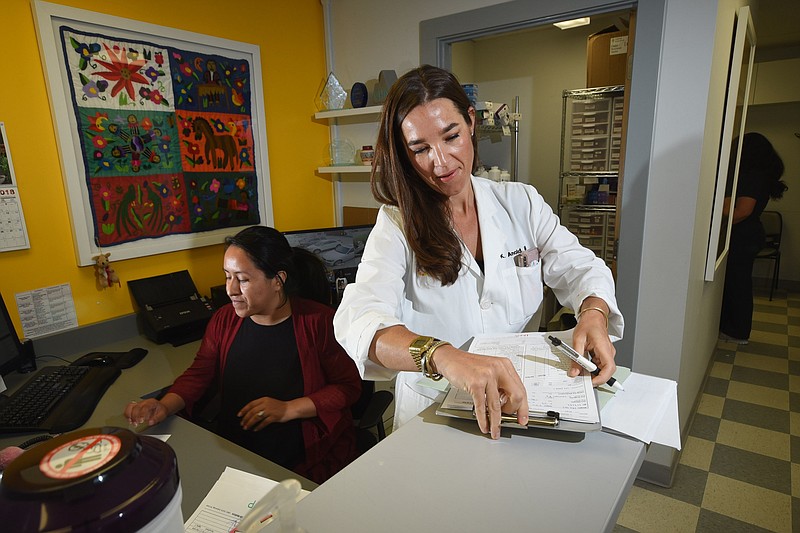For the first time in a decade, the gap between health insurance coverage for Latino children and non-Latino children is growing, something medical experts said will have negative short- and long-term impacts for families in Chattanooga.
The new data is according to a report released in March by the Georgetown University Center for Children and Families and UnidosUS, the nation's largest Latino nonprofit advocacy organization. There were nearly 1.6 million uninsured Latino children in the United States in 2018, making them twice as likely to be uninsured as non-Latino children.
Across the country, Latino children are disproportionately affected by lack of insurance coverage - they make up 25% of all U.S. children but nearly 40% of all uninsured children. Two states - Georgia and Texas - account for more than 60% of the drop in coverage, according to the report.
Tennessee experienced a 4% increase in the number of uninsured Latino children between 2016 and 2018. Alabama saw a 25% increase and Georgia's population increased by 32%. Latino children in all three states are 2.5 times more likely to be uninsured than their non-Latino counterparts.
Dr. Kelly Rodney Arnold, founder and medical director at Clinica Medicos in Chattanooga, said families without insurance often delay getting medical care. Clinics will not take them without insurance. They fear the hospital system. Or they are unable to pay the steep costs of treatment. Delaying care during a pregnancy can lead to a preterm birth. Not treating a sinus infection can make it more serious, she said.
"We talk about illnesses that with immediate attention could be pretty easily taken care of that then turn into graver illnesses that consume more resources at a higher cost to the patient," Arnold said. "It's unmet needs, whether that's vaccines or that's a screening, that turn into a larger public health issue."
States that did not expand Medicaid had higher rates of being uninsured among Latino children, the report found. Several states in the Southeast - including Tennessee, Georgia and Alabama - chose not to expand Medicaid, which researchers say improves health among some of the most vulnerable populations. Last year, Tennessee Gov. Bill Lee proposed receiving federal Medicaid funds through a block grant, freeing up the state to make more decisions on how the money is used, something opponents say will put more people at risk of losing coverage.
The nationwide drop in coverage between 2016 and 2018 was due in part to cuts to Medicaid and the Children's Health Insurance Program. There is also a climate of fear in immigrant communities from being labeled un-American or seen as undocumented, despite 95% of Latino children being citizens. More than half of Latino children in the U.S. live in a mixed-status household, meaning one parent is not a citizen, leading the entire family to be less likely to provide information to the government, the report said.
The report said people are also avoiding enrolling in Medicaid or other assistance programs over fears that doing so will hurt their ability to receive a visa under the U.S. Department of Homeland Security's "public charge" test, which weighs an immigrant's economic resources to determine whether the person will need public assistance in the future. The long-standing rule was tightened in 2019. However refugees, pregnant women and children are excluded from the test.
Raising awareness about various programs and how those programs can help is a job often left to local advocacy groups, said Lily Sanchez, communications coordinator for La Paz Chattanooga, a social services agency.
"Oftentimes our families will come in seeking assistance with medical bills and they won't know that they qualify or that their children qualify for certain programs," Sanchez said.
Applications for programs like TennCare are complicated and families can easily lose coverage if some information is missing from a form or TennCare does not receive all the paperwork, Sanchez said. La Paz refers people to several clinics throughout the city, including Clinica Medicos.
People who are enrolled in TennCare may change cellphones or move, something common among people with lower incomes, and then miss notices to re-enroll and maintain coverage, said Dr. Tiffany Meador, a doctor with Clinica Medicos.
There is a kind of cultural and technological literacy in understanding government programs that goes beyond simply having something translated into Spanish, Arnold said.
"Computer literacy and navigating the information pathway to coverage is a really difficult thing for our patients, many of whom don't have an email address," she said. "Computer literacy and access, not just physically but technologically, is a real issue we take for granted that we overlook."
The doctors said the lack of coverage has people needing care falling through the cracks. There is a "trifecta of improbability" in Chattanooga for uninsured, Spanish-speaking Latino children, especially in accessing mental health care, Arnold said. Connecting children with the services they need requires clinics having an immediate opening, taking uninsured patients and having a translator available at the time of crisis.
The gaps in health coverage leave Chattanooga residents going untreated or paying huge bills to receive treatment in emergency rooms or urgent care facilities.
"We've seen heart-breaking tales of uninsured patients just desperate to find someone who cares," Arnold said. "It's sad that we live in a dichotomous world of insured and uninsured, and human care is divided along those lines."
Contact Wyatt Massey at wmassey@timesfreepress.com or 423-757-6249. Follow him on Twitter @news4mass.
